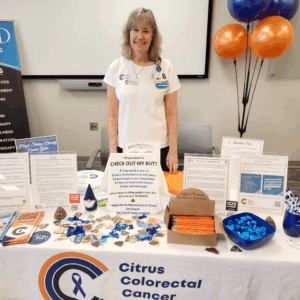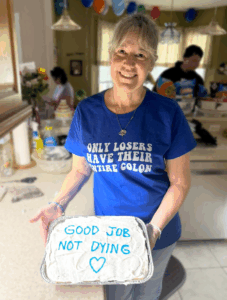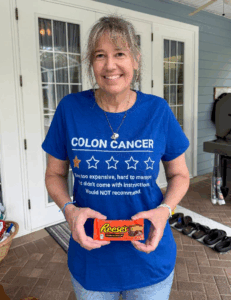
Study Analyzes Young Adult Patients With Rectal Bleeding
Between 2021 and 2023, 443 adults younger than 50 were experiencing rectal bleeding and underwent a colonoscopy at the University of Louisville Health System in Kentucky. Forty-four percent of the patients were diagnosed with early-onset colorectal cancer (EOCRC).
Researchers conducted a retrospective study analyzing those patients and presented the findings at the American College of Surgeons (ACS) Clinical Congress 2025.
“This research lends support to the question of who does or doesn’t warrant a colonoscopy. If you have a person below the screening age with rectal bleeding, you should seriously consider a colonoscopy,” said senior author Sandra Kavalukas, M.D., FACS, a colorectal surgeon at the University of Louisville School of Medicine.
Symptoms Dismissed as Perimenopausal

When she tried to donate blood in May 2020, she was turned away because her hemoglobin level was low. After blood tests revealed she had iron deficiency anemia, her family doctor ordered a colonoscopy to determine the cause.
AMSURG physician partner and gastroenterologist Trupti Shinde, M.D., performed the colonoscopy at AMSURG’s Citrus Endoscopy and Surgery Center in nearby Crystal River and found a 5 cm mass in Fisher’s colon.
Fisher was 54 when she was diagnosed with Stage 2A colorectal cancer.
“If I had been screened on time, they may have found a polyp [and] removed it, and I would have gone on with my life as normal,” she said.
Doctors were able to remove the tumor, and she did not require radiation or chemotherapy.
Survivor Celebrates 5-year Colon Cancer-versary
Following her diagnosis, Fisher adopted a healthier lifestyle and diet. This summer, however, she celebrated her five-year cancer-versary on July 12 with a special menu.
“Prior to diagnosis, I was a chocoholic and didn’t always eat very healthy. The day they found a mass in my colon, I decided to give up junk food and sodas and eat healthier,” she said. “At my party, I decided to celebrate with chocolate and junk food — all the things I had given up for five years.”

“While I was happy to be five years cancer free, I struggled a little with survivor’s guilt since some of my colon cancer friends were still fighting Stage 4 on a daily basis,” she said.
Today, Fisher donates her time at the Citrus Colorectal Cancer Foundation, which she co-founded with her surgeon, Parth Patel, M.D., and Dr. Shinde.
“I feel like God had a plan for me to get diagnosed with colon cancer so I could help others,” Fisher said.
Prioritize Your Colorectal Cancer Screening

People who have a family history of the disease or a history of precancerous polyps may need to be screened earlier. Regardless of your age, if you have digestive system issues, visit your doctor.
Colorectal cancer often begins as a growth, called a polyp, inside the colon or rectum. Although there are several screening options, Fisher recommends a quality colonoscopy, the only test where polyps can be both detected and removed before they become cancerous.
“If you see blood in the toilet, you need to tell your doctor about it. It might only be hemorrhoids, but the only way to find out for sure is to have a colonoscopy,” Fisher said. “Never let them tell you that you are too young. No one is too young for colon cancer.”
Anyone who receives a positive stool test or colorectal cancer blood test needs a follow-up colonoscopy.
AMSURG ambulatory surgery centers are located nationwide and offer patients a more attractive option for colonoscopy screening with easy access, personalized care and a relaxed atmosphere.
About AMSURG
AMSURG is an independent leader in ambulatory surgery center services, operating a network of more than 250 surgery centers nationwide. In partnership with physicians and health systems, the organization delivers high-quality patient care across a diverse spectrum of medical specialties, including gastroenterology, ophthalmology and orthopedics. Guided by its core values — Care Deeply, Champion Excellence, Cultivate Integrity and Celebrate Teamwork — AMSURG is committed to transforming the future of ambulatory surgery center care and services with a focus on strategic growth and innovation. To learn more about AMSURG, visit www.amsurg.com.
